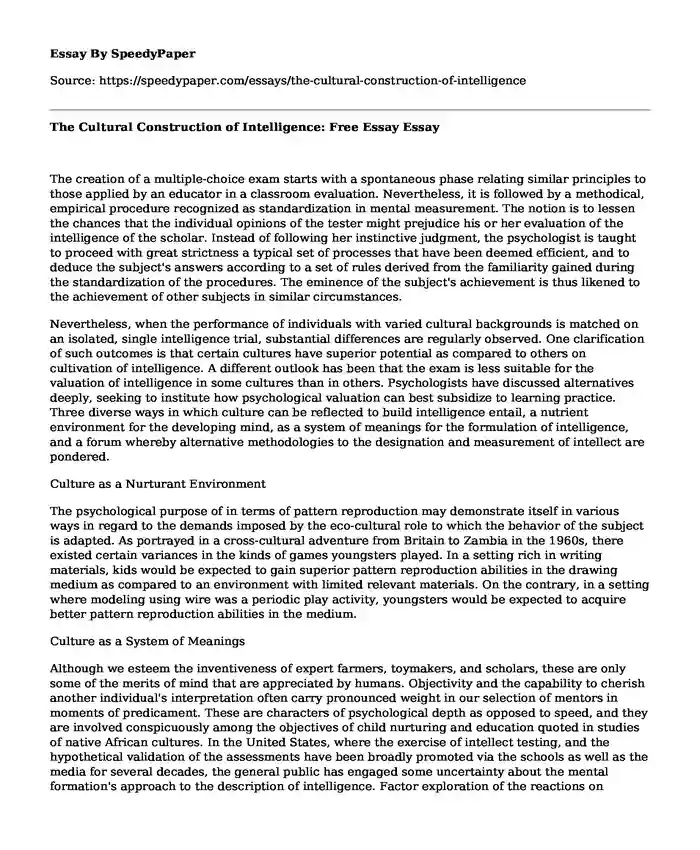
| Type of paper: | Essay |
| Categories: | Culture Intelligence |
| Pages: | 3 |
| Wordcount: | 730 words |
The creation of a multiple-choice exam starts with a spontaneous phase relating similar principles to those applied by an educator in a classroom evaluation. Nevertheless, it is followed by a methodical, empirical procedure recognized as standardization in mental measurement. The notion is to lessen the chances that the individual opinions of the tester might prejudice his or her evaluation of the intelligence of the scholar. Instead of following her instinctive judgment, the psychologist is taught to proceed with great strictness a typical set of processes that have been deemed efficient, and to deduce the subject's answers according to a set of rules derived from the familiarity gained during the standardization of the procedures. The eminence of the subject's achievement is thus likened to the achievement of other subjects in similar circumstances.
Nevertheless, when the performance of individuals with varied cultural backgrounds is matched on an isolated, single intelligence trial, substantial differences are regularly observed. One clarification of such outcomes is that certain cultures have superior potential as compared to others on cultivation of intelligence. A different outlook has been that the exam is less suitable for the valuation of intelligence in some cultures than in others. Psychologists have discussed alternatives deeply, seeking to institute how psychological valuation can best subsidize to learning practice. Three diverse ways in which culture can be reflected to build intelligence entail, a nutrient environment for the developing mind, as a system of meanings for the formulation of intelligence, and a forum whereby alternative methodologies to the designation and measurement of intellect are pondered.
Culture as a Nurturant Environment
The psychological purpose of in terms of pattern reproduction may demonstrate itself in various ways in regard to the demands imposed by the eco-cultural role to which the behavior of the subject is adapted. As portrayed in a cross-cultural adventure from Britain to Zambia in the 1960s, there existed certain variances in the kinds of games youngsters played. In a setting rich in writing materials, kids would be expected to gain superior pattern reproduction abilities in the drawing medium as compared to an environment with limited relevant materials. On the contrary, in a setting where modeling using wire was a periodic play activity, youngsters would be expected to acquire better pattern reproduction abilities in the medium.
Culture as a System of Meanings
Although we esteem the inventiveness of expert farmers, toymakers, and scholars, these are only some of the merits of mind that are appreciated by humans. Objectivity and the capability to cherish another individual's interpretation often carry pronounced weight in our selection of mentors in moments of predicament. These are characters of psychological depth as opposed to speed, and they are involved conspicuously among the objectives of child nurturing and education quoted in studies of native African cultures. In the United States, where the exercise of intellect testing, and the hypothetical validation of the assessments have been broadly promoted via the schools as well as the media for several decades, the general public has engaged some uncertainty about the mental formation's approach to the description of intelligence. Factor exploration of the reactions on intelligence analysis discloses two main features, among the classifications by the experts, emphasizing on verbal skill and problem-solving capability.
Culture as a Forum
In case a parent's idea of intelligence and reasoning development vary from those understood in the school course, the parent is faced with several choices. The parent can opt treat home and school as matching environments, each having a unique agenda for the youngsters socialization. A more far-reaching alternative is not to sign up one's kids in school at all. In certain societies, this alternative is forbidden by law. Conceivably, the most demanding approach is to challenge the conflict between the parents' ethnic agenda and that of an education institute, pursuing through negotiation so as to work out a fresh curriculum that reacts to both sets of objectives.
Conclusion
Since intelligence is essentially a culturally built feature of the human cognizance, scientific models of intelligence should integrate the commonsense perceptions of the general society. Specialized psychologists should adjust their definitions, their evaluation methods, in addition to their involvements in the light of positive and open dialogue with other members of the culture. This is the case because the existing division between typical cultural understanding and practical psychology can hardly be resolved by simply selling the concepts of science to the members of the public.
Cite this page
The Cultural Construction of Intelligence: Free Essay. (2020, Nov 26). Retrieved from https://speedypaper.net/essays/the-cultural-construction-of-intelligence
Request Removal
If you are the original author of this essay and no longer wish to have it published on the SpeedyPaper website, please click below to request its removal:
- Free Essay: Being a Good Noodle from One College Student to Another
- Essay Sample on How Race Determines Confidence in Educational Institutions in the US
- Free Essay about the Research Conducted on the Importance of Taking Time to Celebrate
- Essay Sample on Theoretical Approaches Used to Describe the Environmental Policy
- Paper Example: Is Technology Limiting Creativity?
- Free Essay. Analysis of James Turrell's Aten Reign
- Essay Example on Using Data to Enhance Hiring Decisions
Popular categories




